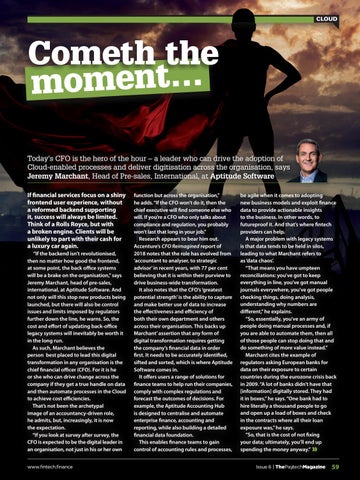CLOUD
Cometh the moment… Today’s CFO is the hero of the hour – a leader who can drive the adoption of Cloud-enabled processes and deliver digitisation across the organisation, says Jeremy Marchant, Head of Pre-sales, International, at Aptitude Software If financial services focus on a shiny frontend user experience, without a reformed backend supporting it, success will always be limited. Think of a Rolls Royce, but with a broken engine. Clients will be unlikely to part with their cash for a luxury car again. “If the backend isn’t revolutionised, then no matter how good the frontend, at some point, the back office systems will be a brake on the organisation,” says Jeremy Marchant, head of pre-sales, international, at Aptitude Software. And not only will this stop new products being launched, but there will also be control issues and limits imposed by regulators further down the line, he warns. So, the cost and effort of updating back-office legacy systems will inevitably be worth it in the long run. As such, Marchant believes the person best placed to lead this digital transformation in any organisation is the chief financial officer (CFO). For it is he or she who can drive change across the company if they get a true handle on data and then automate processes in the Cloud to achieve cost efficiencies. That’s not been the archetypal image of an accountancy-driven role, he admits, but, increasingly, it is now the expectation. “If you look at survey after survey, the CFO is expected to be the digital leader in an organisation, not just in his or her own www.fintech.finance
function but across the organisation,” he adds. “If the CFO won’t do it, then the chief executive will find someone else who will. If you’re a CFO who only talks about compliance and regulation, you probably won’t last that long in your job.” Research appears to bear him out. Accenture’s CFO Reimagined report of 2018 notes that the role has evolved from ‘accountant to analyser, to strategic advisor’ in recent years, with 77 per cent believing that it is within their purview to drive business-wide transformation. It also notes that the CFO’s ‘greatest potential strength’ is the ability to capture and make better use of data to increase the effectiveness and efficiency of both their own department and others across their organisation. This backs up Marchant’ assertion that any form of digital transformation requires getting the company’s financial data in order first. It needs to be accurately identified, sifted and sorted, which is where Aptitude Software comes in. It offers users a range of solutions for finance teams to help run their companies, comply with complex regulations and forecast the outcomes of decisions. For example, the Aptitude Accounting Hub is designed to centralise and automate enterprise finance, accounting and reporting, while also building a detailed financial data foundation. This enables finance teams to gain control of accounting rules and processes,
be agile when it comes to adopting new business models and exploit finance data to provide actionable insights to the business. In other words, to futureproof it. And that’s where fintech providers can help. A major problem with legacy systems is that data tends to be held in silos, leading to what Marchant refers to as ‘data chaos’. “That means you have umpteen reconciliations: you’ve got to keep everything in line, you’ve got manual journals everywhere, you’ve got people checking things, doing analysis, understanding why numbers are different,” he explains. “So, essentially, you’ve an army of people doing manual processes and, if you are able to automate them, then all of those people can stop doing that and do something of more value instead.” Marchant cites the example of regulators asking European banks for data on their exposure to certain countries during the eurozone crisis back in 2009. “A lot of banks didn’t have that [information] digitally stored. They had it in boxes,” he says. “One bank had to hire literally a thousand people to go and open up a load of boxes and check in the contracts where all their loan exposure was,” he says. “So, that is the cost of not fixing your data; ultimately, you’ll end up spending the money anyway.” Issue 6 | ThePaytechMagazine
59
